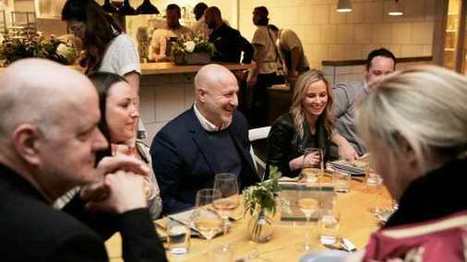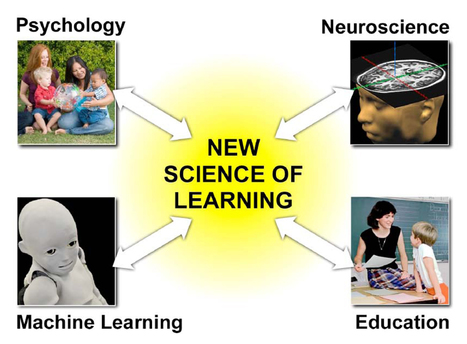 Your new post is loading...
 Your new post is loading...
Running a business is an inherently emotional experience. Even the most stoic leaders are bound to find themselves becoming invested not only in outcomes, but in people and processes as well. While emotional leadership is often regarded as a liability, lack of personal investment can also bring about negative outcomes. I’ve learned that the best leaders are those who can recognize emotionally-charged situations, rise above the passions of the movement, and maintain a level head. Good leaders are quick to listen and slow to anger.
Via The Learning Factor
We call ourselves “human beings,” but I think that title is aspirational: one we are meant to earn. Being human should mean we are capable of higher-level thought and can choose rationally how we respond to external events as well as to internal thoughts and emotions. Now, I don’t know about you, but all I need is to be cut off in traffic or have my husband use the wrong tone of voice to witness my own inability to do this well. Perhaps the most surprising element in business today is that we often behave in ways that are extremely ineffective and quite beneath us. Even those among us who are highly educated senior-level professionals fall into these traps.
Via The Learning Factor
The 2017 WISE Summit will convene November 14-16 2017, in Doha, Qatar. This year’s theme, Co-exist, Co-create: Learning to Live and Work Together reflects the commitment of WISE to address important education challenges in times of disruption and economic uncertainty stemming from conflict, mass migration, growing inequality, on-going, rapid technological change and other forces.
Via Bibiana Vargas
Teddy Roosevelt did it. Harry Truman did it. Want to be an outstanding leader? Keep a leadership journal. As part of my executive coaching work, one of the most effective tools I recommend that powers up the coaching process is a leadership journal. The exercise of leadership is not unlike a sport you play. When you review your actions in the field you learn what worked, what didn’t, and adjust along the way. Leadership guru Peter Drucker said: “ Follow effective action with quiet reflection. From the quiet reflection will come even more effective action. ”
Via The Learning Factor, Kevin Watson, Bobby Dillard
You might just want to dive in head first, but stopping to make sure you’ve got all the information you need can save you later on.
Via The Learning Factor
Research has shown that when we receive an email, we’re predisposed to view the tone of that message negatively–or at least more negatively than the sender intended it. Given that everyone has this natural “negativity bias” against email, it’s important to pay close attention to your phrasing. For the most part, we use email either to remind people about things they said they’d do, or to ask them to do something for us. In the absence of social cues, this is a delicate task. With that in mind, here are a few tips for making your emails friendly and appealing—without running on too long or coming off as ingratiating.
Via The Learning Factor
In any fast growing company, it's natural that conflict arises. It holds true at just about any company -- every type, every stage. Doesn't matter what market or size. You'll see it happen most between functional areas. Sometimes marketing and operations will be at odds. Sometimes, it's marketing and sales, or sales and finance. Technology may want to go one direction, marketing another. Finance might lean too conservative. It's why it's super important for your leadership team to have strong interpersonal skills and interactions. You can't rely on hiring great people alone. You also need to set the pace for solid interactions, help create and foster them. Nurture it at every turn. We accomplish it a few ways at my company.
Via The Learning Factor
Homework is now part of the school curriculum but you forget many children have parents who just can’t help
Via Scoopingaddress
We're already more than a week into January, but I'm still slowly working my way through all the "best of" year-end lists out there (there are so many of them!). Combing through these recommendations may be time-consuming, but it's worth the commitment, I've found, as sometimes you turn up an absolute gem you missed earlier in the year. Take the post titled "The Two Minutes It Takes to Read This Will Improve Your Writing Forever," by marketer Josh Spector, for example. As short as it is useful, the piece is one of the most recommended posts of 2016, Medium informs me. It's not hard to see why. Spector offers five dead-simple changes you can make to basically any piece of writing in a matter of seconds that will make it more forceful and compelling. We'd all enjoy reading a bit more if more writers followed his tips.
Via The Learning Factor
You have a great product or service. You have the funds to make it happen. Now, the big question is "Do you have the people to stand by you and execute?" The biggest question for entrepreneurs today is how to create a culture to keep your dream growing to its full potential. The answer is by creating a place for people to continue to develop both professionally and personally. Dividing professional and personal development is an oxymoron. One feeds the other. And when you have an environment of mutual respect and open communication, more people want to hang around with you and make magic at work. The hardest part of work is the people piece. It needs on-going attention to keep productivity high and stress low. Here are 11 questions to ask yourself and your team to make sure you are heading in the right direction.
Via The Learning Factor
Emotions play an active role in almost all of our decision making. That's one reason why emotional intelligence, the ability to identify, understand, and manage those emotions, is such an invaluable skill. But how specifically does emotional intelligence help us with our daily tasks? Here are three tips to make sure your next presentation is emotionally intelligent: 1. Don't get anxious. Get excited. All of us get nervous before a presentation, even if we've done it hundreds of times. So take that nervousness and turn it into something positive: enthusiasm.How do you do that exactly? Spend those final few moments reviewing your favorite parts of the presentation. Remind yourself why you're doing this, and focus on the value you have to deliver to your listeners. Now, take that enthusiasm and give a talk that you passionately believe in.
Via The Learning Factor
|
Forming a first impression of someone takes seconds, and that can feel impossible to nail when you’re in a job interview. Luckily, most hiring managers take more time to form their opinion. A study published in the Journal of Occupational and Organizational Psychology found that the first 15 minutes are when an impression is made during an interview, and that’s enough time to connect and sell yourself. We spoke with hiring managers and found out what impresses them. Here are eight things to do to help you land the job.
Via The Learning Factor
Have you ever heard about someone “cutting the line” to land their dream job? They’re the people getting the perfect position without ever submitting a resume, or negotiating a sweet signing bonus plus five weeks’ vacation, or getting hired for a role the company created just for them. How do they do it? Are they just naturally golden? Or do they know something you don’t? While you might use the word lucky, these folks aren’t necessarily more talented; they’ve simply perfected a way of approaching the job search in a manner others haven’t been trained in (or are fearful of adopting). This out-of-the-box approach gives them a notable advantage when it comes to standing out. So what do they know, and how can you follow their lead to make your next transition not only more quickly, but more successfully as well? Do what they do:
Via The Learning Factor
Students are never too young to explain their thinking. When teachers encourage them to back up their claims with evidence from a young age, they will be more
Via paul rayner
Teddy Roosevelt did it. Harry Truman did it. Want to be an outstanding leader? Keep a leadership journal. As part of my executive coaching work, one of the most effective tools I recommend that powers up the coaching process is a leadership journal. The exercise of leadership is not unlike a sport you play. When you review your actions in the field you learn what worked, what didn’t, and adjust along the way. Leadership guru Peter Drucker said: “ Follow effective action with quiet reflection. From the quiet reflection will come even more effective action. ”
Via The Learning Factor
88 percent of employees who participated in the 2016 SHRM Employee Job Satisfaction and Engagement Survey, indicated that they were satisfied with their current job. This marks the highest level of satisfaction over the past ten years. Although there are many reasons that contributed to this statistic, "respectful treatment of employees at all levels" was at the top of the list for the second year in a row. It even beat out major players like pay, benefits and job security. (Did anyone else start singing a little Aretha Franklin?) I'm not sure why I was surprised by this stat. It makes sense that if you're spending the majority of your waking hours somewhere that interpersonal relationships and culture would be important. It's also no surprise that when the participants were specifically asked about engagement, 77 percent indicated "relationships with their co-workers" was the most important. Let's take a look at how you can cultivate the two biggest factors of employee happiness at work.
Via The Learning Factor
With so much learning content available, exploring only the best stuff on the web is crucial for your time and sanity.
We’ve saved you all those hours of painful Google searching with this list of great knowledge sources, inspiring blogs, tools, communities and course platforms that will help you discover fresh ideas or master new skills.
The final list was manually compiled by our expert panel from +250 nominees based on a scoring system analysing learning experience, content quality, and price.
Via John Evans
“This growth mindset is based on the belief that your basic qualities are things you can cultivate through your efforts. Although people may differ in every which way in their initial talents and aptitudes, interests, or temperaments, everyone can change and grow through application and experience.” This is important because it can actually change what you strive for and what you see as success. By changing the definition, significance, and impact of failure, you change the deepest meaning of effort. In this mindset, the hand you’re dealt is just the starting point for development.
Via paul rayner
Imagine you could have a skill where--in any given conversation with colleagues, clients, or subordinates--you could be keenly aware of, and even experience, their feelings and thoughts. Sounds like some X-Men-like psychic superpower right? Well, what if I told you that anyone can have this uncanny ability and use its strength and charm to have successful conversations? Well, you can. The superpower I refer to is called empathy. But this skill--and it is a learned skill available to anyone--is often misunderstood because there are variations of it. I'll get to the science of it shortly.
Via The Learning Factor, THE OFFICIAL ANDREASCY, Stephania Savva, Ph.D
Resolutions are often an exercise in wishful thinking. People rarely keep them, mostly because they’re vague about their goals and don’t have a plan for following through. But that isn't the only thing that may weaken resolve or slow progress toward a goal. Failing to understand some practical brain science can just as quickly do you in. Neuroscience has shown us this year that we may actually have everything we need to stay focused, be more creative, remember more, and make better decisions—just as long as we can work a bit more with our brains, not against them. Here are a few things we learned that can take you closer toward being your best self in 2017.
Via The Learning Factor
Around half the population of the United States woke up on Wednesday morning to enormous disappointment. In a stunning upset, Donald Trump defeated Hillary Clinton in the race for president, leaving Trump supporters elated and many Clinton backers devastated. But in my work as a coach, I've found that even the most crushing defeats can ultimately be channeled into energy for forging ahead. Regaining confidence is an uphill battle, and it takes a crowd—or at least two people, talking things out—to pull an someone out of a funk. Here's how it can be done.
Via The Learning Factor
Your brain takes mental shortcuts all the time in order to make decisions efficiently. Because that takes place unconsciously, we can never fully control these "cognitive biases" that help us deal with the outside world—and, ultimately, survive in it. As practical as they may be, though, some of these biases can be problematic. But the first step toward gaining a little more leverage over how your brain—and others' brains—make judgments is simply to understand the rules it follows to do so. Getting better acquainted with these three may help you become more influential with others.
Via The Learning Factor, Yashy Tohsaku
"The best online and hybrid courses are made from scraps strewn about and gathered together from across the web. We build a course by examining the bits, considering how they’re connected, and creating pathways for learners to make their own connections. The design-process is what distinguishes online teaching most from traditional on-ground teaching. "
Via Sabrina M. BUDEL
|



 Your new post is loading...
Your new post is loading...

















![[...] Homework widens the gap between rich and poor children | Michael Rosen | KILUVU | Scoop.it](https://img.scoop.it/8x1qsDNgTlUenHpzhM9ohjl72eJkfbmt4t8yenImKBVvK0kTmF0xjctABnaLJIm9)































What does it mean to listen? Listening points to four levels: what we can see and hear, the emotions and thoughts, the sensations and what's wanting to emerge (or not). How much of our listening is directed to each of these four levels? Do we really listen when we speak? Do we listen inwards, outwards, both, or neither? Listening comes from the feminine side of us, specially deep listening. What is needed for a deeper listening? What is all this noise telling us?
Leaders often mistake anger for power and fear for respect. But as we can see readily in the news these days, angry bosses and leaders are rarely effective. Having a good yell may feel cathartic in the moment, but it creates a toxic environment and erodes your standing amongst your team.